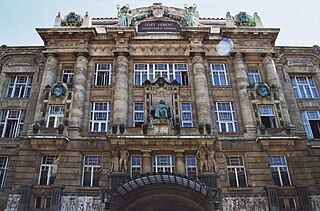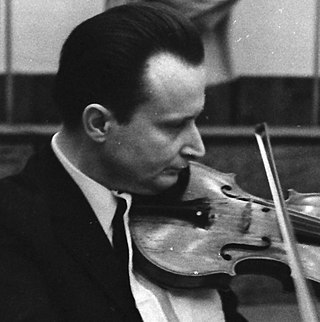Related Research Articles

Béla Viktor János Bartók was a Hungarian composer, pianist, and ethnomusicologist. He is considered one of the most important composers of the 20th century; he and Franz Liszt are regarded as Hungary's greatest composers. Through his collection and analytical study of folk music, he was one of the founders of comparative musicology, which later became ethnomusicology.
The Gramophone Classical Music Awards, launched in 1977, are one of the most significant honours bestowed on recordings in the classical record industry. They are often viewed as equivalent to or surpassing the American Grammy award, and referred to as the Oscars for classical music. They are widely regarded as the most influential and prestigious classical music awards in the world. According to Matthew Owen, national sales manager for Harmonia Mundi USA, "ultimately it is the classical award, especially worldwide."

Ernst von Dohnányi was a Hungarian composer, pianist and conductor. He used a German form of his name on most published compositions.
James Ehnes, is a Canadian concert violinist and violist.

Tibor Serly was a Hungarian violist, violinist, and composer.
Annie Fischer was a Hungarian classical pianist.
Rivka Golani is a world–renowned Israeli-born viola player. She has performed as soloist with many orchestras throughout the world including the Boston Symphony, Calgary Philharmonic, Royal Concertgebouw, BBC Symphony, BBC Philharmonic, Hong Kong Symphony, Singapore Symphony, Royal Philharmonic, Rotterdam Philharmonic, Israel Philharmonic, Tokyo Metropolitan, Montreal Symphony and the Toronto Symphony.

Tibor Varga was a Hungarian violinist, conductor, and world renowned music teacher who developed pedagogic methods for teaching string music. He was a founding member of the string department in the Detmold music conservatory.
Grigory Romanovich Ginzburg was a Soviet pianist.
Louis Philip Kentner was a Hungarian, later British, pianist who excelled in the works of Chopin and Liszt, as well as the Hungarian repertoire.

Dezső Ránki is a Hungarian virtuoso concert pianist with a broad repertoire and a significant discography of solo, duo and concerto works.

Antal Zalai is a Hungarian concert violinist.

Nathan "Tossy" Spivakovsky, a Jewish, Russian Empire-born, German-trained violin virtuoso, was considered one of the greatest violinists of the 20th century.
Kristóf Baráti is a Hungarian classical violinist.

Pál Lukács was a Hungarian viola virtuoso, concert and recording artist, and music educator.
Gerhard Taschner was a noted German violinist and teacher.

Zoltán Gárdonyi was a Hungarian composer and musicologist. He taught at the Franz Liszt Academy of Music for 26 years.

Dénes Kovács was a Hungarian classical violinist and academic teacher, described as "pre-eminent among Hungarian violinists". He won the Carl Flesch International Violin Competition in 1955. In his career as a soloist and recording artist, he premiered and recorded the works of 20th-century Hungarian composers, and was also noted for his recordings of Bartók and Beethoven. From 1967 to 1980, he headed the Franz Liszt Academy of Music in Budapest, Hungary's principal music college. He received many national awards including the Kossuth Prize (1963).
István Sárközy was a Hungarian classical composer, music critic, editor and academic teacher. His compositions date from the 1940s to 1979, and include works for musical theatre, choral works and songs, orchestral and chamber works, and works for piano. Notable examples include the stage works Liliomfi (1950) and Szelistyei asszonyok, the chamber cantata Júlia énekek, the overture Az ifjúsághoz, and the Sinfonia concertante for clarinet and strings (1963). He taught at the Franz Liszt Academy of Music from 1959.
József Soproni was a Hungarian composer.
References
- ↑ "Tibor Ney - Notable Alumni - Liszt Ferenc Academy of Music (in Hungarian)".
- ↑ Recorded live in the studio of Hungarian Radio on 13 January 1950, published in 1980
- ↑ "A Budapest Bartok Bonanza The New York Times, January 17, 1965 - By THEODORE STRONGIN".
- ↑ "Tibor Ney - Notable Alumni - Liszt Ferenc Academy of Music (in Hungarian)" . Retrieved 16 September 2016.
- ↑ Gy. Lehel: Secret of Tibor Ney, Muzsika 1981. 4. (LFZE Notable Alumni cites it (in Hungarian) Tibor Ney